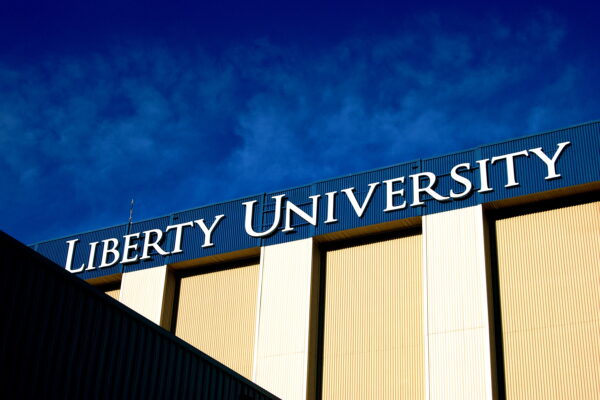This post originally appeared on Trans-Missions, the USC Knight Chair in Media and Religion site.
‘Tis the season for university graduation ceremonies and the accompanying competition for the most famous—or perhaps infamous—commencement speakers. On May 15, Jerry Falwell’s Liberty University scored on both counts when Fox News personality Glenn Beck delivered the commencement address to the class of 2010 and, in return, got an honorary “Doctorate of Humanities” degree.
Beck was predictably reduced to tears upon receiving the honorary doctorate from Liberty. And while he won a standing ovation from the 28,000 people in attendance at the graduation ceremony, off campus, Beck’s presence was a source of commentary and controversy among conservative Christians and the news media alike. Much of the buzz crackled with speculation about the meaning of the blossoming relationship between political players with apparently incompatible religious views—Beck, a Mormon, and Liberty U, an intellectual redoubt for fundamentalist Christianity.
In response, spokespersons for Liberty pointed out that the school has historically invited commencement speakers who did not necessarily share its fundamentalist Christian perspective; indeed, a glance at the list of commencement speakers over the last several years bears out this claim. The roster includes former Nixon speechwriter and game show host Ben Stein in 2009, Newt Gingrich in 2007, John McCain in 2006 and Karl Rove in 2004.
What these speakers have in common isn’t their religious beliefs but their identity as key players in the Republican political ranks. That is, their status as well-connected conservative cultural and political insiders was more important to Liberty than their orthodoxy on theological matters. Which makes the choice of Glenn Beck—a television personality—much more interesting than whether his Mormonism jibes with Liberty’s fundamentalism.
The week after Beck’s address, Jerry Falwell Jr. appeared on Beck’s show twice, along with the president of Westminster Seminary, an evangelical school in Philadelphia, to discuss the founding fathers and the supposed un-Christian and communist roots of “social justice” movements. Beck, who claims to be neither a Republican nor a Democrat, has a large following on radio and television, and of the seven books he has released since 2007 (yes, seven!), five of them have hit number one on the New York Times best-sellers list.
The media juggernaut that is Glenn Beck far exceeds any of the other Liberty U commencement speakers over the last several years, yet unlike Rove or Gingrich or McCain he is not an establishment conservative. His speech at Liberty, and the appearances of Jerry Jr. on Beck’s show, suggests that both the university and Beck may be charting a new course for conservative Christians politics.
While the news media have focused on the strange religious bedfellows angle of Beck’s gig at Liberty, perhaps the larger—and more interesting—story is why Falwell chose an apparent outlier like Beck to speak at his university’s commencement, while his father favored establishment Republicans.
As the midterm election season heats up, keeping an eye on the relationship between conservative Christians and charismatic figures like Glenn Beck and Sarah Palin—as well as how this relationship affects the Republican Party—bears watching. Will evangelical and fundamentalist Christians move away from the Republicans and toward Tea Party candidates or other independents? Or will they continue their longstanding alliance with establishment Republican politics? With an audience of millions each week, Beck is in a good position both to comment on and influence these evolutions.
Photo Credit: Taber Andrew Bain/Flickr
Richard Flory is the executive director of the USC Center for Religion and Civic Culture.








